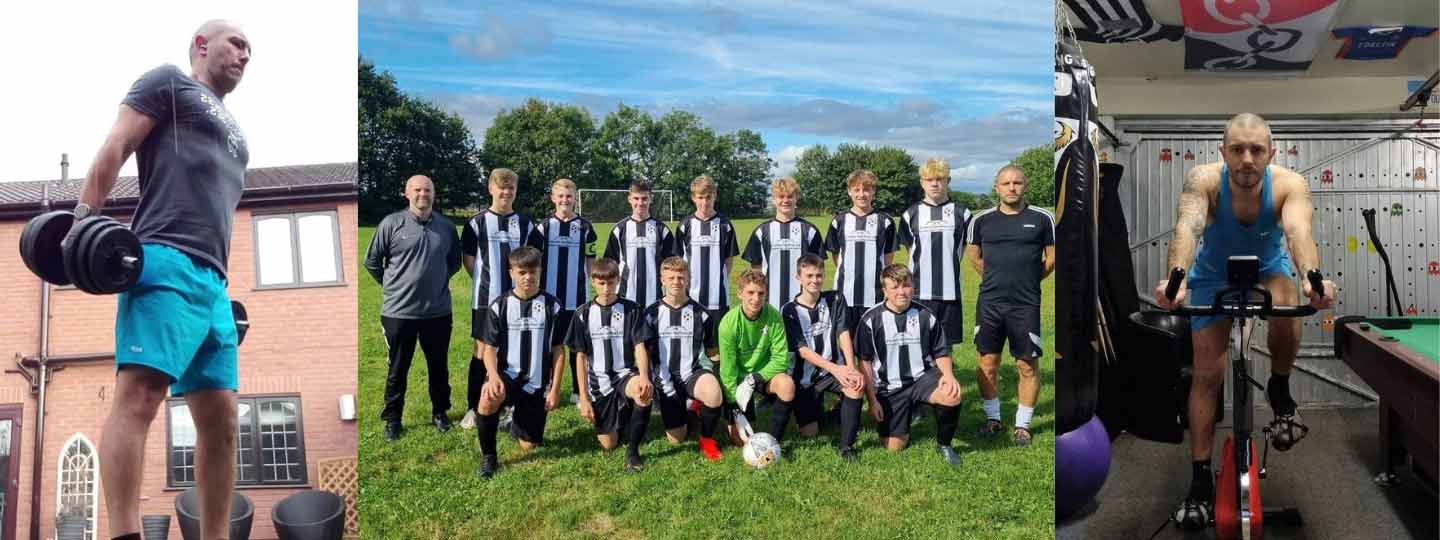“I lived for football and to be told that I couldn’t play anymore really affected me.”
15 February 2022
Football lover, Thomas was diagnosed with arthritis following a football injury. He shares how he’s adapted his exercise routine since diagnosis and following his recent knee replacement.
“I was 18 when I snapped my anterior cruciate ligament (ACL) in my right knee whilst playing football.”
I had an operation to repair the ACL, had rehab and it snapped again when I returned to football.
I had a full reconstruction and a year of rehab. I made it through a dozen training sessions, but my ACL snapped again when doing a simple turn. I had another new full reconstruction when I was 21. This fixed the issue, and I was back playing football after a year getting fit again.
My knee used to swell up after each game, but it was manageable. Things began to change in my mid-30s, as it was starting to take a week to recover from a match. I had to stop playing football altogether at 36, even though I’d made the move to play part-time.
I’d managed some 5k and 10k races and competed in Tough Mudder events. All of this had to stop due to the osteoarthritis damage to my knee.
“My knee would click and clunk when I was walking.”
I had a large bone growth spur on my knee which caused a lot of discomfort and several fluid-filled cysts.
My knee would give way with no notice. I had floating bone which would clog up the joint. I was struggling to walk up and down stairs by the end.
My sleep was massively affected. I was waking up at night in discomfort and not being able to get back to sleep for long periods. I had to use a hot water bottle to help soothe the pain.
Three months ago, I had a total knee replacement and I’m still on the path to recovery.
“Osteoarthritis has taken its toll on me, physically and mentally.”
I lived for football. It’s been my life from a young age. To be told that I can no longer play has really affected me.
To have running taken away too has really hurt. My job as a child abuse investigator is stressful. You have to have a good off switch, and mine was football and exercise.
I feel it would be good for more people to be aware that osteoarthritis isn’t just for older people. It can affect anyone from an early age. This can have a negative effect on your mental health, when the diagnosis stops you from doing what you’d like to do.
I did find something new that I loved, and that was Body Combat classes. I did these at the gym and at home via the on-demand app. This gave me the same energy of 90 minutes of football.
Now, I have had the knee replacement, I hope to be able to get back to the classes soon.
“I’ve always relied on exercise to help my mental health.”
I feel I have had a lot to overcome, and that’s why I keep pushing myself with fitness and try to inspire others. That’s why I coach football teams for children.
During the pandemic lock downs, I put on training classes via zoom as I wanted to help the kids keep well physically and mentally.
We did work outs together from home and this helped them keep active and socialise with their teammates whilst being stuck at home.
I like motivating others to get fit and feel the benefits of working out for mental health. This passion has inspired me to record my fitness journey on my Instagram.
“Days after my knee replacement, I was online finding ways to work out.”
To help rebuild my fitness after my operation, I sat on a garden chair lifting heavy battle ropes and a medicine ball. I sat on a bench throwing punches like I was in my Body Combat class.
All this was to show that you can find exercises to help you, even after a major operation.
I’m still coaching the kids’ football teams, and this helps me to stay connected with my footballing passion too.
“My advice to others with arthritis would be...”
There are so many exercises you can do; it’s about trying different things and finding out what helps you.
- I have managed to always find a way. Before my knee replacement, if I had a major flare up, I would turn to the boxing bag and do this kind of workout, as it impacted less on my knee joint. As I couldn’t run or play football.
- Find a passion or hobby which gives you that same buzz.
- You won’t stick to any plan or regime if you don’t actually enjoy it too. Exercise is what helps me and is my release.
- Everyone is different. Keep going, try different things and don’t let your diagnosis get better of you.
We’re here for you
- If you would like to talk to someone, you can call our free helpline on 0800 5200 520
- Chat to our Arthritis Virtual Assistant.
- Join our online community.
- Stay in touch and follow us on Twitter, Facebook and Instagram.
You might also be interested in...
-
“I wasn’t open enough, so the pain stayed hidden.”
Keir is 35 and is recovering from a total knee replacement after living with severe osteoarthritis throughout his twenties.
-
Exploring the link between joint injury and osteoarthritis
Our research is looking at the association between joint injury and the risk of developing osteoarthritis.